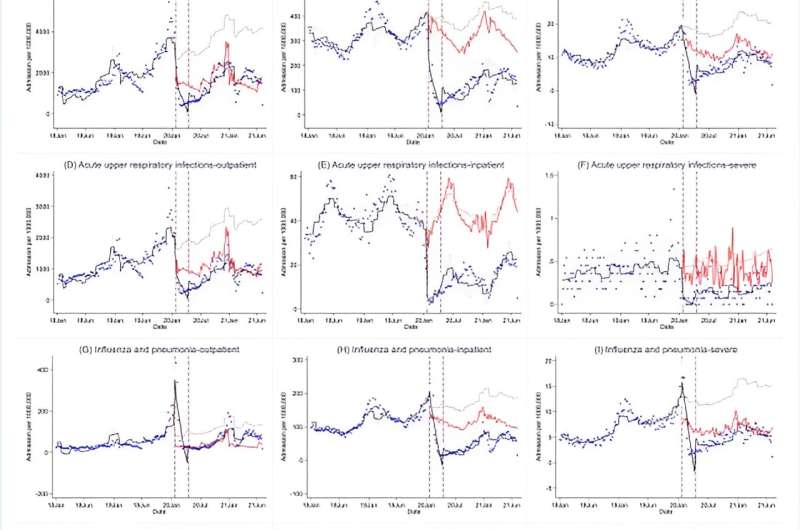This article has been reviewed according to Science X's editorial process and policies. Editors have highlighted the following attributes while ensuring the content's credibility:
fact-checked
proofread
Study finds reduced inpatient and severe respiratory disease visits during COVID-19 in Wuhan, China

In Wuhan, China, a stringent lockdown was implemented to contain the spread of COVID-19, transitioning to a normalized prevention and control strategy. Considering the shared transmission route through the respiratory tract, mask-wearing, social distancing, and personal hygiene have been linked to reduced transmission of respiratory pathogens other than SARS-CoV-2. However, there has been less investigation into the broader spectrum of respiratory diseases, particularly in less developed countries.
In a new study published in the journal Global Transitions, a team of Chinese researchers examined the trends in hospital visits for acute and chronic respiratory diseases between 2018 and 2021 using the national health insurance data from Wuhan.
"Hospital visits for all the investigated diseases decreased during the lockdown period," shares first author of the study Xuemin Zhu from Tsinghua University. "While visits for control conditions rebounded to pre-pandemic levels in the later normalized prevention and control period, visits for respiratory disease exhibit a more sustained impact from the pandemic."
Notably, inpatient and severe condition visits for respiratory disease remained reduced even after the lockdown was lifted. Guanqiao Li, corresponding author of the study and also from Tsinghua University, emphasized that this research holds implications for future outbreak preparedness, health care resource allocation, and respiratory disease prevention and management.
"During the lockdown, community-level NPIs and government policies, particularly stay-at-home orders and travel restrictions have impeded patients' access to health care services, primarily explaining the substantial decrease in hospital visits for all investigated diseases.
"Our findings underscore the importance of proactive preparedness by health care sectors to effectively manage outbreaks while ensuring the continued provision of essential medical services," Li explains.
The team noted that the decrease in inpatient and severe condition visits for respiratory diseases upon the return to normal daily life is likely a result of the wide and consistent mask-wearing, social distancing, and personal hygiene improvement.
While these reductions cannot be attributed to any single factor, the personal-level NPIs may have effectively reduced the incidence of severe respiratory diseases. Further, the researchers believe that health care systems should bolster their resilience to ensure rapid adaptability to diverse health care needs in the ongoing presence of the pandemics.
More information: Xuemin Zhu et al, Reduction in inpatient and severe condition visits for respiratory diseases during the COVID-19 pandemic in Wuhan, China, Global Transitions (2024). DOI: 10.1016/j.glt.2023.12.001




















